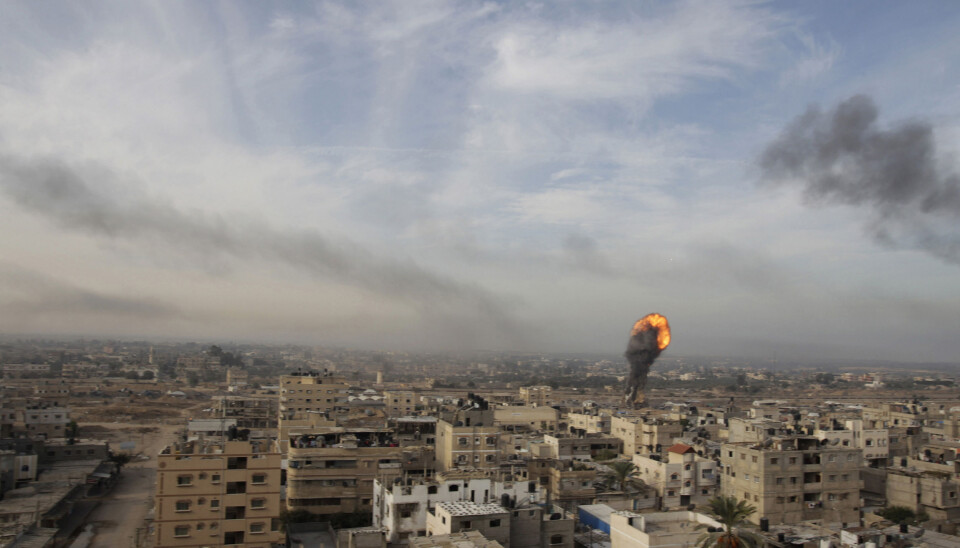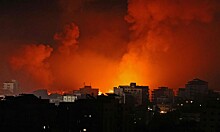Debatt ● 9 Palestinian academics
Now is the time to stand up for your colleagues in Palestine
The higher education sector in Palestine is in urgent need of international support.

OBS! Denne artikkelen er mer enn tre år gammel, og kan inneholde utdatert informasjon.

Denne teksten er et debattinnlegg. Innholdet i teksten uttrykker forfatterens egen mening.
(Navn på forfattere og øvrige signaturer står nederst i teksten.)
At the time of writing, Israel has bombed Gaza for eleven consecutive days. Among the casualties are family homes, book shops, health clinics, a research centre, an ice cream factory, a library, a mattress factory, a publishing house, businesses, schools, electricity lines, roads leading to hospitals – and, at the time of writing, the lives of 256 Palestinians, out of which 69 are children.
In East Jerusalem, Palestinians are being driven out of their homes in Sheikh Jarrah. Across the West Bank, Palestinians are being killed and wounded by live bullets as they protest the Israeli military occupation.
The West Bank, Gaza and East Jerusalem are home to 52 higher education institutions. All these institutions, and the academics that works there, have always been severely affected by the Israeli occupation. During the first intifada, the Palestinian uprising from 1987 to 1993, higher education institutions were completely shut down by Israel. Underground higher education moved covertly into churches, mosques, community centres and academics’ own homes.
During the Israeli bombing of Gaza in 2014, 14 of the 15 higher education institutions were damaged. Three colleges and six university buildings were fully destroyed. The financial cost of these damages was estimated at USD 21.1 million. Seven universities in Gaza were also damaged during Israeli airstrikes in November 2012.
We are Palestinian academics who cooperate with the University of Oslo and Oslo Metropolitan University (OsloMet) through a Norad funded research and development project (E-Pal). The objective of the E-Pal project is to support the development of online and blended learning at Palestinian higher education institutions. We would like to share with Norwegian academics how we are affected by the ongoing attack by Israel on Palestinian higher education.
It is difficult to describe with words what has been going on in Gaza under this barbaric, horrific and gruesome aggression. The nonstop violent airstrikes and missiles have destroyed everything, killing civilians including innocent children and women, demolishing homes, and causing enormous damage on infrastructure.
The West Bank, Gaza and East Jerusalem are home to 52 higher education institutions. All these institutions, and the academics that work there, have always been severely affected by the Israeli occupation
Some of us are academics at the University College of Applied Sciences (UCAS), a higher education institution in Gaza. We have been tragically going through bloodshed, terror and destruction. It's been the most terrifying and scary chapter yet in our long ordeal.
At UCAS, we have lost one of our beloved and brilliant colleagues, Reema Saad. She was killed along with her two children after their home was bombed when they were sleeping. Two of our students, including a mother with her 10-month-old baby, have also been brutally killed.
Like hundreds of Gazans whose homes have been bombed, two of our academic colleagues are now homeless. Similar to tens of thousands of Palestinians who have been forced to flee from their homes to seek shelter, many academics went through this harsh experience.
I (Aya ElMashharawi) am one of them. After spending a deadly night in my area, where heavy shelling surrounded us and the windows of my house scattered over our heads, I had to seek a safer place for my children. I went to my parents’ house in Gaza's central district, which was supposed to be safer. However, nowhere in Gaza is safe or secure.
This place, which I persuaded myself and my children to be safer, is riddled with horrifying death traps. On our right side was the massive destruction of two residential towers and the massacre of two neighbouring families. On our left, we have been witnessing the nonstop bombing of civilian targets. Everyone here now has their own tragic story to tell.
Our nights were turned into a burning hell, with death smelling everywhere and every second. In the morning, we checked on each other amid the smoke of the intense bombing that could take our lives at any moment. We are alive but have been witnessing all forms of heinous deaths.
At PPU, many of our students have been killed and injured by the Israeli occupiers. Some of those students have been left paraplegic and have lost the chance to pursue their education.
With their deadly rockets and missiles, the Israeli occupation attempts to target not only our lives but also to kill our dreams. Due to the mobility restrictions imposed by the occupation, I (Aya ElMashharawi) am one of several academics who is pursuing a PhD online as we are determined to achieve our goals. However, this savage war has greatly damaged infrastructure for electricity and internet. As a result, we are left behind in our academic pursuits. The war has halted all aspects of life in Gaza.
Some of us are academics at the Palestine Polytechnic University (PPU) in Hebron in the West Bank. At PPU, many of our students have been killed and injured by the Israeli occupiers. Some of those students have been left paraplegic and have lost the chance to pursue their education. A large number of PPU students have been detained in Israeli military prisons for shorter or longer periods of time.
As a professor at this university, I (Mohammed Tamimi) had to deal with many cases of students who were imprisoned for months and years under a system that allows Israeli to detain people without due process. The use of torture in Israeli prisons is well documented. Such students face major problems when they are released and find it very hard to re-enroll at university long after their cohorts have graduated. Others cannot go back to study because they do not have any source of income and are forced to find any job to make ends meet.
One major effect of the Israeli occupation is mobility restrictions. Staff and students are forced to be absent due to different kinds of military closures, including the lock down of the refugee camps and villages where they live. In addition, the Israeli military periodically closes Hebron city and its entrances, preventing a large number of students and staff from commuting to the university.
In short, academic life in Palestine is very different from most parts of the world. However, we are steadfast because we are defending a righteous and just cause. We need fellow academics around the world to join us in this cause. The higher education sector in Palestine is in urgent need of international support. We call upon all who work in Norwegian higher education to:
- Join the Palestinian civil society’s call for boycott, divestments and sanctions of Israel. The Palestinian Campaign for the Academic and Cultural Boycott of Israel (PACBI) was initiated in 2004 to contribute to the struggle for Palestinian freedom, justice and equality. It advocates for a boycott of Israeli academic and cultural institutions for their deep and persistent complicity in Israel’s denial of Palestinian rights that are stipulated in international law.
- Amplify the voices of Palestinian scholars and educate yourself about the Palestinian cause. One of the main obstacles for justice in Palestine is the lack of recognition of Palestinians as a colonised and occupied people. Palestinian scholars such as Edward Said, Rashid Khalidi, Lila Abu Lughod and Karma Nabulsi have long worked to spread awareness of the colonial history that underlies the oppression of the Palestinian people. We ask academic communities to educate themselves about Palestine and to share this knowledge with family, friends and colleagues. We ask those who do research on Palestine to collaborate with your fellow Palestinian academics.
- Make your support for Palestine heard in social media. Social media is now a very important tool for Palestinians in their struggle for freedom because these platforms help the world to hear our voice. Please add your voices of support on platforms such as Facebook, Snapchat and Twitter using the following hash tags:
#SaveSheikhJarrah
#PalestineUnderAttack
#GazaUnderAttack
#FreePalestine
Signed (The E-Pal project group):
- Mohammed Mushtaha, University College of Applied Sciences, Gaza, Palestine
- Aya Elmashharawi, University College of Applied Sciences, Gaza, Palestine
- Mohammed Almasri, University College of Applied Sciences, Gaza, Palestine
- Mohammed Tamimi, Palestine Polytechnic University, Hebron, Palestine
- Razan Awawdeh, Palestine Polytechnic University, Hebron, Palestine
- Khawla Muhtaseb, Palestine Polytechnic University, Hebron, Palestine
- Nancy Alriji, Palestine Polytechnic University, Hebron, Palestine
- Raed Amro, Palestine Polytechnic University, Hebron, Palestine
- Iyad Abualrub, University of Oslo
- Hege Hermansen, Oslo Metropolitan University & University of Oslo
The following have signed this statement in support of their Palestinian colleagues (alphabetical order):
- Hilde Afdal, Østfold University College & Oslo Metropolitan University
- Ana Maria Delgado Aleman, University of Oslo
- Bjørn Arntsen, UiT The Arctic University of Norway
- Bodil Hansen Blix, UiT The Arctic University of Norway
- Marry-Anne Karlsen, University of Bergen
- Mirjana Coh, University of Oslo
- Ingrid Rodrick Beiler, Oslo Metropolitan University
- Audun Bjerknes, University of Oslo
- Thea Mathilde Lium Dahlborg, University of Oslo
- Joke Dewilde, University of Oslo
- Kari Anne K. Drangsland, University of Bergen
- Gunn Engelsrud, Western Norway University of Applied Sciences
- Ester Fremstad, University of Oslo
- Anniken Førde, UiT The Arctic University of Norway
- Lars Gule, Oslo Metropolitan University
- Marie Hatlelid Føleide, Oslo Metropolitan University
- Magnus Hontvedt, University of Oslo
- Kari Jegerstedt, University of Bergen
- Jonas Yassin Iversen, Inland Norway University of Applied Sciences
- Rachel Jakhelln, UiT The Arctic University of Norway
- Siri Jønnum, University of Oslo
- Guro Kirkerud, Oslo Metropolitan University
- Tatsiana Komissarova, University of Oslo
- Anne Leseth, Oslo Metropolitan University
- Andreas Lund, University of Oslo
- Paola Løvland, University of Oslo
- Marte Mangset, Oslo Metropolitan University
- Sølvi Mausethagen, Oslo Metropolitan University
- Jan Messel, Oslo Metropolitan University
- Camilla Mevik, Oslo Metropolitan University
- Omid Mirmotahari, University of Oslo & Oslo Metropolitan University
- Hans Magnus Nedreberg, University of Oslo
- Helene Nilsen, University of Bergen
- Gry Paulgaard, UiT The Arctic University of Norway
- Kim Pedersen Phillips, Oslo Metropolitan University
- Hanne Riege, Oslo National Academy of Arts (Emerita)
- Maiken Risan, Oslo Metropolitan University
- Kjetil Rommetveit, University of Bergen
- Ragnhild Sandvoll, UiT The Arctic University of Norway
- Mariann Solberg, UiT The Arctic University of Norway
- Sissel Sollied, UiT The Arctic University of Norway
- Tone Dyrdal Solbrekke, University of Oslo
- Roger Strand, University of Bergen
- Helge Strømsø, University of Oslo
- Molly Sutphen, University of Oslo
- Kristin Vasbø, University of Oslo
- Trond Waage, UiT The Arctic University of Norway
- Rebekka Walle, University of Oslo
- Marte Lorentzen, Oslo Metropolitan University
- Fredrik Graver, Inland Norway University of Applied Sciences
- Walter Schönfelder, UiT - Norges arktiske universitet






Nylige artikler
Fafo fjernet maleri av Rød-Larsen fra lokalene
En løsbar forskningskrise
Høyreekstrem student drept. Minister ber universiteter avlyse politiske arrangement
Trakk seg fra lederstilling etter e-poster om utstilling med mindreårige modeller
Masteroppgavens verdi ligger i selve arbeidet — ikke kun i det ferdige produktet
Mest leste artikler
— Aktører ville stoppe munnen på meg
Epstein-oppvask i akademia: Stadig flere blir strippet for oppgaver
De fleste har enekontor og faste plasser. Men det er to unntak
Foreleser mistenkes for å ha funnet opp sin egen «nobelpris» og gitt den til seg selv
Forsker hevdet at død pasient ga samtykke